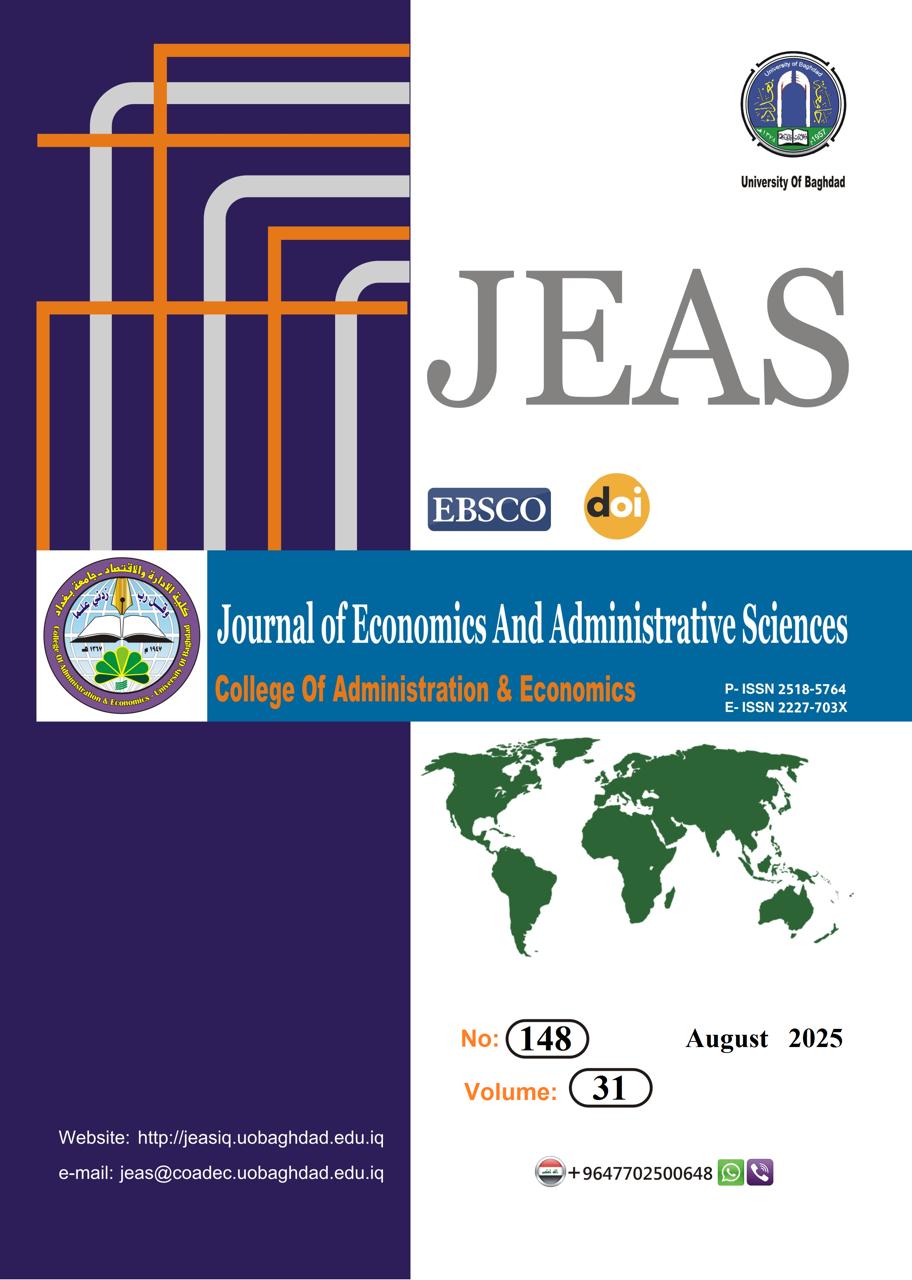The Effect of Strategic Awareness on Organizational Brilliance: An Analytical Research in Dhi Qar Oil Company
DOI:
https://doi.org/10.33095/bnpdy547Keywords:
Strategic awareness, organizational brilliance, Dhi Qar Oil Company.Abstract
The research deals with the impact of strategic awareness and its dimensions (Reframing, System Thinking, Reflecting, and Learning Orientation) on organizational Brilliance and its dimensions (Leadership Brilliance, Service Brilliance, and Knowledge Brilliance) of Dhi Qar Oil company. The research addresses the following question: “To what extent does strategic awareness affect the organizational brilliance of Dhi Qar Oil Company?”. The study followed the descriptive analytical approach to ensure the accuracy of the results and conclusions. The sample included the general manager and his assistants, directors of bodies, department managers, and division managers. Data were collected using a questionnaire distributed to 113 leaders and were analyzed using SPSS V.28 to test the hypotheses and research questions. The results highlight the great interest of the company's leaders in strategic awareness, which reflects its compatibility with the company's investment operations. This awareness is vital in light of local and global economic changes and greatly affects the company's ability to achieve organizational Brilliance in the oil sector.
Paper type: Research paper.
Downloads
References
Abbas, Z. A. (2021). The Role of Strategic Dialogue in Entrepreneurial Behavior by Mediating the Entrepreneurial Strategy Compass - Analytical Research in the Ministry of Foreign Affairs. University of Baghdad.
Abdul Gafoor, K. (2012). Considerations in measurement of awareness. National Seminar on Emerging Trends in Educations, November, 1–6. https://doi.org/10.13140/2.1.2109.2643
AL-abidy, Ali Razaaq. (2017). The Workplace Fun as Moderator Variable between Leadership Virtuousness and Organizational Brilliance (Applied study at the University of Kufa). Journal of Economics and Administrative Sciences, 23(97), 153. https://doi.org/10.33095/jeas.v23i97.304
Al-afandi, ahmed talal. (2019). Measuring the Quality of Government Web Service According to (NetQual) Scale an Exploratory Study for a Sample of Social Media Users. Tikrit Journal of Economic and Administrative Sciences, 15(46).
Al-Hadrawi, R. H., Al-Dahbawi, A. A., & Al-Zubaidi, H. H. (2018). The Role of Strategic Awareness in Achieving Organizational Sustainability: An Exploratory Study in the Al-Najaf Cement Factory. Journal of the University of Kufa, College of Administration and Economics. 500–522.
Al-janabi, R. Z. (2021). The Effect Of Strategic Intelligence On Entrepreneurial Success Through The Mediating Role Of Strategic Entrepreneurship. Master Thesis. University of Karbala.
Al-kinane, H. D. (2024). The combined impact of strategic awareness and human resources flexibility in strategic response processes An analytical research at Al-Sadr Teaching Hospital in Masan Governorate A. Master Thesis. University of Sumer.
Al-Ubaidi, Ali taher et, all. (2022). The effect of strategic awareness in supporting the dimensions of organizational improvisation Analytical research at the headquarters of the Iraqi Ministry of Finance. Master Thesis. University of Baghdad.
al Shobaki, M., Abu Naser, S., & Abu Amuna, Y. (2017). Learning Organizations and Their Role in Achieving Organizational Excellence in the Palestinian Universities. International Journal of Digital Publication Technology, 1(2), 135–157. www.ijdpt.org
Alabdaly, D., & Almayali, E. (2021). The Impact of Strategic Awareness on Organizational Readiness: An Analytic Research of the Opinions of the Sample of Top Leaderships in Private Colleges in the Provinces of the Al-Furat Al-Awsat in Iraq. Webology, 18(2), 487–508. https://doi.org/10.14704/web/v18i2/web18335
Alerasoul, S. A., Afeltra, G., Hakala, H., Minelli, E., & Strozzi, F. (2022). Organisational learning, learning organisation, and learning orientation: An integrative review and framework. Human Resource Management Review, 32(3).
https://doi.org/10.1016/j.hrmr.2021.100854
Anderson, J., & Miller, Z. (2014). Journal of Cognition and Neuroethics. Center for Cognition and Neuroethics, 2(1).
Ángel, M., & Phillips, M. (2014). Neuroplanning, conciencia estratégica y creación de valor Neuroplanning, strategic consciousness and value creation. Revista de La Facultad de Ciencias Económicas y Sociales |.
Antonio, R. P. (2020). Developing students’ reflective thinking skills in a metacognitive and argument-driven learning environment. International Journal of Research in Education and Science, 6(3), 467–483. https://doi.org/10.46328/ijres.v1i1.1096
Arnold, R. D., & Wade, J. P. (2015). A definition of systems thinking: A systems approach. Procedia Computer Science, 44, 669–678. https://doi.org/10.1016/j.procs.2015.03.050
Atkins, S., & Murphy, K. (1993). Reflection: a review of the literature. Journal of Advanced Nursing, 18(8), 1188–1192. https://doi.org/10.1046/j.1365-2648.1993.18081188.x
Banyhamdan, K., Aljawarneh, N., Alomari, M., Almasarweh, M. S., & Alwaqfi, A. (2020). Impact of Human Capital in Quality and Strategic Excellences. International Journal of Advanced Science and Technology, 29(7), 11702–11710.
Bolzern-konrad, B. (2016). The Impact of Trust on Employee Competence Utilization in a Business Excellence Setting. University of Latvia, 1–232.
Ceptureanu, S. I., Ceptureanu, E. G., Cristescu, M. P., & Dhesi, G. (2020). Analysis of social media impact on opportunity recognition. A social networks and entrepreneurial alertness mixed approach. Entropy, 22(3), 1–12. https://doi.org/10.3390/e22030343
Çetin, H. (2013). EĞİTİM Kurumlarinda Strateji̇k Planlama Bi̇li̇nç Düzeyi̇ ve Strateji̇k Yöneti̇mde Karşilaşilan Sorunlar Deni̇zli İli̇ Örneği̇. Mustafa Kemal Üniversitesi Sosyal Bilimler Enstitüsü Dergisi, 10(24), 87–112.
Cimpian, andrei, & Leslie, sarah jane. (2017). The Brilliance Trap. Scientific American, 317(3), 60–65. https://doi.org/10.1038/scientificamerican0917-60
Diedericks, E. (2012). Flourishing of employees in the information technology industry in South Africa (Doctoral dissertation, North-West University).
Ghotbabadi, A. R., Feiz, S., & Baharun, R. (2015). Service Quality Measurements: A Review. International Journal of Academic Research in Business and Social Sciences, 5(2), 267–286. https://doi.org/10.6007/ijarbss/v5-i2/1484
Haddab, F. A.-R. (2021). The role of strategic intelligence in improving organizational performance (analytical research). Master Thesis. University of Baghdad.
Harsanyi, J. C. (1980). Advances in Understanding Rational Behavior. Essays on Ethics, Social Behavior, and Scientific Explanation, 89–117. https://doi.org/10.1007/978-94-010-9327-9_6
Harvey, J. F., Johnson, K. J., Roloff, K. S., & Edmondson, A. C. (2019). From orientation to behavior: The interplay between learning orientation, open-mindedness, and psychological safety in team learning. Human Relations, 72(11), 1726–1751.
https://doi.org/10.1177/0018726718817812
Hazim, S. D., Al-Riyadh Khalifa, S., Abdel-hadi, A., & Al-esawy, M. (2022). Sustainable Human Resource Management And Its Role In Achieving Organizational Brilliance : A Field Study In Kronji Company For Soft Drinks And Mineral Water. The Middle East International Journal for Social Sciences (MEIJSS), 4(3), 50–58.
Heinonen, K., & Strandvik, T. (2021). Reframing service innovation: COVID-19 as a catalyst for imposed service innovation. Journal of Service Management, 32(1), 101–112. https://doi.org/10.1108/JOSM-05-2020-0161
Hlehel, M. S. (2022). Dialogical leadership and its impact on building strategic partnerships by mediating strategic perception Analytical research in companies of the Ministry of Housing and Construction A. University of Baghdad.
John, J. B., Newell, S., & Currie, W. (2010). Paradoxical effects of institutionalisation on the strategic awareness of technology in organisations. Journal of Strategic Information Systems, 19(3), 171–183. https://doi.org/10.1016/j.jsis.2010.07.001
Joseph, D., & Dibrell, A. C. (2012). Fostering strategic awareness at an organization’s boundary. The Eletronic Library: Leadership & Organization Development Journal, 33(4), 322–341.
Kadhim Zrar, I., & Abd Al Wadud Al-Abbasi, A. (2024). The Effect of Strategic Containment on Organizational Brilliance : An Analytical Research in Ur State Company. Journal of Economics and Administrative Sciences, 30(140), 254-271 . https://doi.org/10.33095/eme0p212
Karimi, L., Dadich, A., Fulop, L., Leggat, S. G., Eljiz, K., Fitzgerald, J. A., Smyth, A., Hayes, K. J., & Kippist, L. (2017). Brilliant health service management: challenging perceptions and changing HR practices in health services. Asia Pacific Journal of Human Resources, 57(2), 174–190. https://doi.org/10.1111/1744-7941.12189
Lahtinen, S. (2020). Reframing the Role of Companies in Sustainability. Toward business sustainability transitions. Tampere University Dissertations, 251, 2020.
Muhamed, R. (2013). Hermeneutics and artistic awareness in contemporary Western philosophical discourse.
Muhsen, W. Y. Taha, Abdel Rahman Mustafa (2015). Knowledge Sharing Requirements To Improve The Quality Of The Audit Works In The Federal Board Of Supreme Audit Of Iraq. Journal of Economic and Administrative Sciences, 21(86), 128–172. https://doi.org/10.33095/jeas.v21i86.843
Nadason, S., Saad, R. A.-J., & Ahmi, A. (2017). Knowledge Sharing and Barriers in Organizations. Indian-Pacific Journal of Accounting and Finance, 1(4), 32–41. https://doi.org/10.52962/ipjaf.2017.1.4.26
Nafei, W. A. (2016). The impact of talent management on organizational performance. Case Studies Journal, 5(8), 395–402.
Nakapan, W., & Radsiri, S. (2012). Visual training in virtual world: A comparative study between traditional learning versus learning in a virtual world. International Conference on Computer-Aided Architectural Design Research in Asia, January, 569–578. https://doi.org/10.52842/conf.caadria.2012.569
Rashid, A. I., & Hussein Almallah, I. T. (2020). Social capital and the extent of its contribution to enhancing the management of excellence: An applied study at Azadi Hospital / Duhok. Journal of Economics and Administrative Sciences, 26(124), 298-320. https://doi.org/10.33095/jeas.v26i124.2042
Rumaid, J. J., & Ismail, F. M. (2020). Reflection of the community participation in enhancing organizational excellence. Journal of Economics and Administrative Sciences, 26(124), 165-182. https://doi.org/10.33095/jeas.v26i124.2036
Salman, R. Y. (2023). The knowledge orehestration and its impact on organizational brilliance through dynamic capabilities. Ph.D Thesis. University of Baghdad.
SARIISIK, M., TURKAY, O., & HALIS, M. (2010). Institutional Strategic Consciousness and Its Reflections: Research on Qualified Hotels in Istanbul. Journal of Global Strategic Management, 2(4), 160–170. https://doi.org/10.20460/jgsm.2010415833
SELIGMAN, M. E., & MAIER, S. F. (1967). Failure To Escape Traumatic Shock. Journal of Experimental Psychology, 1–9. https://doi.org/10.1037/h0024514
Shaked, H., & Schechter, C. (2020). Systems thinking leadership: New explorations for school improvement. Management in Education, 34(3), 107–114.
https://doi.org/10.1177/0892020620907327
Silvia, P. J., & Duval, T. S. (2001). Objective self-awareness theory: Recent progress and enduring problems. Personality and Social Psychology Review, 5(3), 230–241. https://doi.org/10.1207/S15327957PSPR0503_4
Spoelstra, S. (2009). Organizational brilliance: On blinding visions in organizations. Journal of Organizational Change Management, 22(4), 373–385.
https://doi.org/10.1108/09534810910967152
Stoyanova, T., & Iliev, I. (2017). Employee Engagement Factor for Organizational Excellence. International Journal of Business and Economic Sciences Applied Research, 10(1), 23–29. https://doi.org/10.25103/ijbesar.101.03
Turkay, O., Halis, M., Sariisik, M., & Calman, I. (2012). Effects of strategic consciousness and strategic planning on business performance: A comparative study of the industries in Turkey. African Journal of Business Management, 6(32), 9188–9201. https://doi.org/10.5897/ajbm11.250
Turnbull, O. H., & Solms, M. (2007). Awareness, Desire, And False Beliefs: Freud In The Light Of Modern Neuropsychology. Cortex, 43(8), 1116–1121. https://doi.org/10.1016/S0010-9452(08)70718-4
Vial, A. C., Muradoglu, M., Newman, G. E., & Cimpian, A. (2022). An Emphasis on Brilliance Fosters Masculinity-Contest Cultures. Psychological Science, 33(4), 595–612. https://doi.org/10.1177/09567976211044133
Waswas, D., & Jwaifell, M. (2019). The Role of Universities’ Electronic Management in Achieving Organizational Excellence: Example of Al Hussein Bin Talal University. World Journal of Education, 9(3), 53. https://doi.org/10.5430/wje.v9n3p53
Salama-Younes, M. (2015). Positive psychology: Applications, concepts and future perspectives in Arab countries. Middle East Journal of Positive Psychology, 1(1), 45–59.
Published
Issue
Section
License
Copyright (c) 2025 Journal of Economics and Administrative Sciences

This work is licensed under a Creative Commons Attribution-NonCommercial-NoDerivatives 4.0 International License.
Articles submitted to the journal should not have been published before in their current or substantially similar form or be under consideration for publication with another journal. Please see JEAS originality guidelines for details. Use this in conjunction with the points below about references, before submission i.e. always attribute clearly using either indented text or quote marks as well as making use of the preferred Harvard style of formatting. Authors submitting articles for publication warrant that the work is not an infringement of any existing copyright and will indemnify the publisher against any breach of such warranty. For ease of dissemination and to ensure proper policing of use, papers and contributions become the legal copyright of the publisher unless otherwise agreed.
The editor may make use of Turtitin software for checking the originality of submissions received.


























